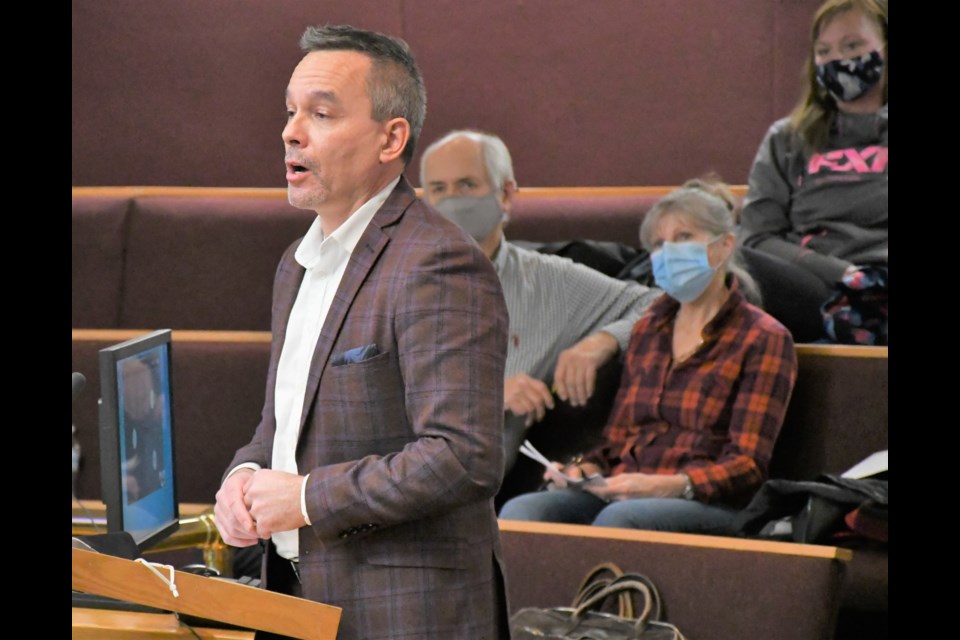Two familes argue that city administration is to blame for refusing to address the Seventh Avenue Southwest bridge, which means city council should do the legally and morally correct thing and override that inaction.
Jim and Deb Thorn, Tim and Corrine Avery and their two children, and the families’ legal counsel David Chow appeared during city council’s Nov. 23 regular meeting. They requested that council reopen one lane of the bridge — the west side — before Christmas as a short-term solution to access their properties.
The families also urged council to repair the three broken pilings next summer and restore the structure to its 2015 condition for minimal cost and start planning to replace or upgrade the bridge within the next decade.
The families have engaged with city administration since April 2019 about the bridge but have received no support. The Moose Jaw Express detailed the families’ plight in a multi-story series this past summer.
Doing what’s right
The families used the bridge for 20 years, but since 2015, they have had to drive two kilometres through Valley View Centre (VVC) property to access their properties, said Deb Thorn. They initially had to move heavy barricades at the entrance to VVC, while recently, they have had to unlock and open a metal gate.
Council should reopen the west lane to local traffic since ice jams did not damage those pilings in 2015, she continued. This move would be a quick and cheap fix, while it would also eliminate the municipality’s liability should emergency personnel need to reach that part of Wakamow Valley.
“I know city administration has applied considerable pressure on the former and current owners of Valley View, to get them to agree to legal and physical access that crosses the Valley View lands as shown (on the maps),” Thorn said.
City hall proposed creating a gravel road between buildings through an unlit back lane that would lead to the locked gate, she pointed out. Had city administration been successful with this “undesirable” action, this might have negated the city’s legal responsibility to reopen the bridge.
“City administration seems determined to thwart our efforts to reopen the bridge regardless of the facts or doing what’s morally correct,” said Thorn. “We are done with city administration’s delays … and secret meetings about us without us.”
Thorn then played a video of a family member attempting to open the locked gate during the recent blizzard.
“It’s time for the City of Moose Jaw to do what’s legally and morally right,” she added.
A lack of municipal services
The damaged bridge not only prevents friends and family from reaching the homes, but it also increases the stress of daily living by reducing municipal services, said Tim Avery. This has also forced the Averys to have friends and family pick up their two children on the bridge’s north side to get them to school.
Many residents have used that area to walk after the bridge was “temporarily” closed six years ago, he continued. This stresses the Thorns and Averys since they have to be more alert when driving through the valley to access their properties.
He remarked that access to one’s property is a right and should not be blocked by poor infrastructure or poor planning.
“Two years of trying to resolve an issue and six years for damaged infrastructure is not acceptable in any case … ,” added Avery. “This is a serious problem that needs to be dealt with now, and no more waiting and no more delays.”
The legal perspective
The City of Moose Jaw has not committed any money to fix this bridge during the past six years, while it has deferred responsibility for too long, said Chow, who was hired by the families back in January.
Chow summarized the promises and commitments that the mayor and city administration made to the families about fixing the bridge that never came to fruition.
Meetings with municipal officials occurred in January and in April, with no results. The families were forced to speak to council behind closed doors in May, which also produced no results. They later learned that administration would bring a report about the bridge to council, but it would be discussed in-camera.
“We were promised many times by administration that they would come back to us,” said Chow.
However, that did not happen, and the families contacted city hall again on June 25. City administration said an update would come by late July, but nothing did.
They reached out to city clerk/solicitor Myron Gulka-Tiechko in September and learned there was nothing new. In October, the group contacted Gulka-Tiechko and learned the report had been presented to the executive committee behind closed doors. The families were not allowed to see it due to sensitive information.
Chow thought city hall could remove that information and give the families a redacted version.
“We don’t need to see that information, but we do need to have a transparent discussion about what it will take to restore the use of the Seventh Avenue bridge,” he added. “Many of you campaigned on public accountability. I implore you to hold administration accountable on this matter.”




